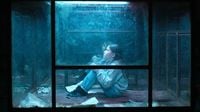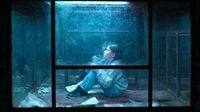On April 15, 2025, Netflix premiered the highly anticipated Swedish crime thriller series "Die Glaskuppel," which translates to "The Glass Dome." This six-part series, created by renowned author Camilla Läckberg, plunges viewers into a chilling narrative that intertwines personal trauma with a gripping mystery.
Set against the stark, icy backdrop of a remote Swedish village, the series follows Lejla, portrayed by Léonie Vincent, a criminologist whose own dark past as a kidnapping victim resurfaces when she returns home. Her journey is not just about confronting her childhood memories but also about solving a new case that echoes her own harrowing experience.
Lejla's return to her hometown is triggered by the death of her adoptive mother, prompting her to reconnect with Valter, her former foster father and a local police officer played by Johan Hedenberg. However, the reunion is overshadowed by the sudden disappearance of a young girl, stirring up old wounds and fears for Lejla.
As Lejla and Valter delve into the investigation, they uncover dark secrets lurking beneath the surface of their seemingly idyllic community. The narrative cleverly juxtaposes Lejla's professional expertise in understanding criminal behavior with her personal struggle to confront her past. The series expertly navigates themes of memory, guilt, and the psychological impact of trauma.
"Die Glaskuppel" is a quintessential Nordic noir thriller, characterized by its atmospheric tension and slow-burning storytelling. Critics have noted that the series effectively captures the essence of the genre, with its cold, desolate setting and a plot that unfolds methodically, drawing viewers deeper into its web of intrigue.
In the first episode, after the funeral of her mother, Lejla finds herself grappling with the resurfacing of her own traumatic memories as the investigation into the missing girl, Alicia, begins. The parallels between Alicia's case and her own childhood abduction create a palpable tension that drives the narrative forward.
Throughout the series, flashbacks offer glimpses into Lejla's harrowing past, including her own kidnapping, which occurred when she was just a child. These haunting memories are visually striking, often portrayed through surreal and intense imagery that enhances the emotional weight of the story. Critics have praised the series for its ability to convey the psychological depth of its characters, particularly Lejla, who embodies the struggles of someone trying to reconcile with a painful history.
As the plot thickens, the relationship between Lejla and Valter becomes increasingly complex. Valter, who was the lead investigator in Lejla's original case, grapples with his own unresolved guilt over not being able to protect her. This shared history adds layers to their partnership as they work together to uncover the truth behind Alicia's disappearance.
In the second episode, tensions rise as Lejla and Valter's independent investigation leads them to clash with the new police chief, Tomas, highlighting the challenges of navigating a small-town dynamic where everyone knows each other. The series effectively portrays the struggles of the characters as they confront not only the external threat of a potential kidnapper but also the internal conflicts stemming from their past traumas.
As the episodes progress, the story delves deeper into the psychological ramifications of crime and the impact it has on both victims and their families. With each revelation, Lejla is forced to confront her own fears and insecurities, blurring the lines between her professional role and personal struggles.
In the climactic final episode, Lejla's journey reaches a turning point as she unravels the truth behind her own abduction and its connection to the current case. The narrative builds to a tense conclusion, leaving viewers on the edge of their seats as the mysteries unfold. Critics have noted that the series does not shy away from exploring the darker aspects of human nature, making it a compelling watch for fans of crime dramas.
Overall, "Die Glaskuppel" stands out not only for its engaging plot but also for its exploration of complex emotional themes. It invites viewers to reflect on the lasting effects of trauma while delivering a suspenseful and thought-provoking narrative. With its rich character development and atmospheric storytelling, the series is poised to resonate with audiences who appreciate the depth of Nordic noir.
As the series continues to gain attention, it is clear that "Die Glaskuppel" is more than just a crime thriller; it is a profound exploration of the human psyche and the ways in which the past can shape our present. Fans of the genre will undoubtedly find much to appreciate in this intricately woven tale of mystery and redemption.









